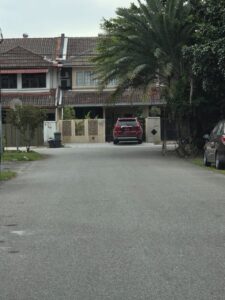
 The orientation and position of a house to surrounding roads play a significant role in determining the flow of energy into the space.
The orientation and position of a house to surrounding roads play a significant role in determining the flow of energy into the space.
One of the most commonly advised warnings in both Vasthu Sastra and Feng Shui traditions is to avoid homes or buildings located directly facing a T-junction or Y-junction.
To the untrained eye, such properties may appear attractive, often with a broad, open view and seemingly easier accessibility.
But energetically, they are highly vulnerable. In Vasthu Sastra, the road that ends at the front of the house is seen as an energy assault, where fast-moving vigour is forced directly into the property.
It’s likened to an arrow aimed at the heart of the home. In Feng Shui, it is referred to as a “poison arrow”, which brings cutting, harsh, and disruptive vibrations into the building.
Homes that sit at the mouth of a T-junction are exposed to unfiltered, aggressive energy from the road.
It does not matter whether the home is facing 100 per cent, 50 per cent or 20 per cent because the effects are similar.
This constant energetic bombardment can disturb the balance of the home and affect its residents in multiple ways.
From my observations, occupants of such homes often face health problems such as fatigue, anxiety, insomnia, or recurring illness, including terminal health issues.
Financial instability where money flows in but disappears rapidly, or income gets blocked unexpectedly.
Emotional disturbances leading to arguments, restlessness, or a general lack of peace and accidents or mishaps, particularly with vehicles or legal complications.
What makes matters worse is that T-junction properties usually lack any natural buffer, like no trees, structures, or landscape features, to slow or soften the incoming energy.
The main door becomes the first and only point of contact for all that the road channels: speed, noise, stress, and even unresolved collective emotions.
Many people think that if a property faces a T-junction, the ill effects in Vasthu can be “fixed” by moving the main door to one side.
Unfortunately, this is a misunderstanding. The problem lies not with the door’s position, but with the entire property’s orientation.
When a road runs directly towards the building like an arrow aimed at its heart, it channels harsh, high-speed energy straight into the plot.
This impact affects the whole property, not just the doorway.
Even if you shift the main entrance to a corner, the land and structure still face the spearing road, and the constant flow of aggressive energy continues to disturb the occupants.
Apart from energetic concerns, there is also the psychological impact. A house that faces a T-junction constantly receives the visual message of a dead-end.
Over time, this can affect the mindset of the dwellers. Feelings of being stuck, going nowhere, or facing constant obstacles may slowly take root, even if life appears normal on the surface.
Similarly, a Y-junction, while slightly less severe, still causes energy to split before it reaches the house, leading to confusion, scattered thoughts, and difficulty in decision-making among residents.
So, what can be done?
For those who already live in T-junction homes and cannot relocate immediately, certain remedial measures can help mitigate the ill effects, although they are not foolproof.
Erecting a protective barrier such as a row of tall plants, a solid gate, or a wall to deflect energy.
Placing sacred objects or symbols at the main entrance, such as a Lord Ganesha statue, and burying Vasthu Yantras in the eight corners of the plot can help reduce the impact.
While these remedies can offer temporary relief, the underlying energetic challenge often remains.
This is why traditional texts consistently advise that, if possible, one should avoid purchasing, building, or renting a home that directly faces a T-junction.
A T-junction home may seem practical or affordable, but the hidden cost is often paid in discomfort, disharmony, or depletion over time.
Therefore, before investing in a property, whether for living or business purposes, it is wise to assess not just the location but also its energetic alignment.
A home should be a place where energy nourishes, not one where it constantly drains.
In conclusion, the best protection is prevention. And when in doubt, always turn to ancient wisdom to guide your modern choices.
Award-winning writer Dr T. Selva is the author of the bestsellers Vasthu Sastra Guide and Secrets of Happy Living. To get a copy, WhatsApp 019-2728464. He can be reached at drtselvas@gmail.com. Facebook: Vasthu Sastra


